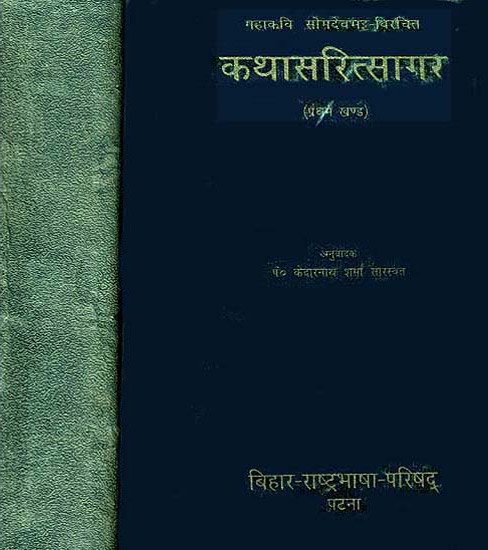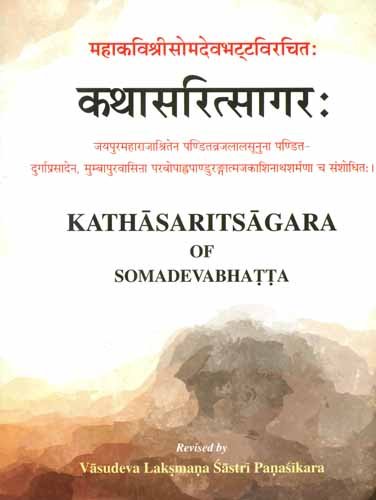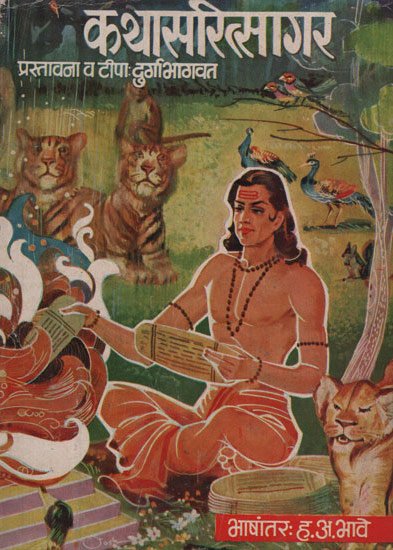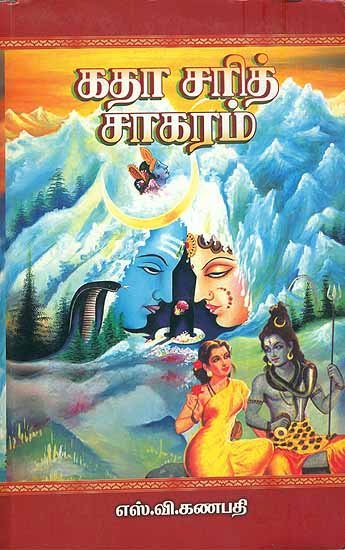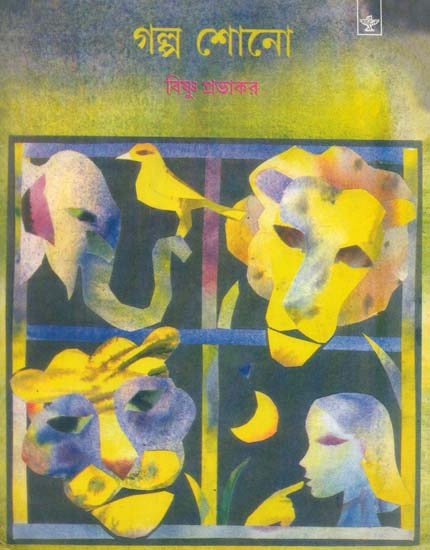Kathasaritsagara [sanskrit]
by C. H. Tawney | 2014 | 226,424 words | ISBN-13: 9789350501351
The Sanskrit edition of the Kathasaritsagara referencing the English translation and grammatical analysis. Written by Somadeva and dating from the 12th century, the Kathasaritsagara (or Katha-sarit-sagara) represents an epic legend narrating the adventures of Naravahanadatta as he strives to become the destined emperor of the Vidyadharas. Alternative titles: (Kathāsaritsāgara, कथासरित्सागर, Kathā-sarit-sāgara)
Verse 6.3.196
एवं विषह्य विधुरस्य विधेर् नियोगम् आपत्सु रक्षितचरित्रधना हि साध्व्यः ।
गुप्ताः स्वसत्त्वविभवेन महत्तमेन कल्याणम् आदधति पत्युर् अथात्मनश् च ॥ १९५ ॥
evaṃ viṣahya vidhurasya vidher niyogam āpatsu rakṣitacaritradhanā hi sādhvyaḥ |
guptāḥ svasattvavibhavena mahattamena kalyāṇam ādadhati patyur athātmanaś ca || 195 ||
The English translation of Kathasaritsagara Verse 6.3.196 is contained in the book The Ocean of Story by C.H. Tawney. This book is available online or you could buy the latest edition:
Read online Buy now! The English translation by C.H. Tawney (2014)
Glossary of Sanskrit terms
Note: This extracts Sanskrit terms and links to English definitions from the glossary, based on an experimental segmentation of verse (6.3.196). Some terms could be superfluous while some might not be mentioned. Click on the word to show English definitions.
Evam, Eva, Vishahya, Vidhura, Vidhi, Niyoga, Apad, Rakshita, Caritra, Dhana, Sadhvi, Gupta, Sva, Svan, Asattva, Vibhava, Mahattama, Kalyana, Pati, Atha, Atman,
Analysis of Sanskrit grammar
Note: this is an experimental feature and only shows the first possible analysis of the Sanskrit text (Kathasaritsagara Verse 6.3.196). If the system was successful in segmenting the sentence, you will see of which words it is made up of, generally consisting of Nouns, Pronouns, Verbs, Participles and Indeclinables. Click on the link to show all possible derivations of the word.
- Line 1: “evaṃ viṣahya vidhurasya vidher niyogam āpatsu rakṣitacaritradhanā hi sādhvyaḥ ”
- evam -
-
evam (indeclinable adverb)[indeclinable adverb]evam (indeclinable)[indeclinable]eva (noun, masculine)[adverb], [accusative single]eva (noun, neuter)[adverb], [nominative single], [accusative single]evā (noun, feminine)[adverb]
- viṣahya -
-
viṣahya (noun, masculine)[compound], [vocative single]viṣahya (noun, neuter)[compound], [vocative single]
- vidhurasya -
-
vidhura (noun, masculine)[genitive single]vidhura (noun, neuter)[genitive single]
- vidher -
-
vidhi (noun, feminine)[ablative single], [genitive single]vidhi (noun, masculine)[ablative single], [genitive single]√vidh (verb class 6)[optative active second single]√vidh (verb class 6)[optative active second single]
- niyogam -
-
niyoga (noun, masculine)[adverb], [accusative single]
- āpatsu -
-
āpad (noun, feminine)[locative plural]
- rakṣita -
-
rakṣita (noun, masculine)[compound], [vocative single]rakṣita (noun, neuter)[compound], [vocative single]√rakṣ -> rakṣita (participle, masculine)[compound from √rakṣ]√rakṣ -> rakṣita (participle, neuter)[compound from √rakṣ]√rakṣ -> rakṣita (participle, masculine)[vocative single from √rakṣ class 1 verb], [vocative single from √rakṣ]√rakṣ -> rakṣita (participle, neuter)[vocative single from √rakṣ class 1 verb], [vocative single from √rakṣ]
- caritra -
-
caritra (noun, neuter)[compound], [vocative single]
- dhanā* -
-
dhana (noun, masculine)[nominative plural], [vocative plural]
- hi -
-
hi (indeclinable particle)[indeclinable particle]
- sādhvyaḥ -
-
sādhvī (noun, feminine)[nominative plural], [vocative plural]
- Line 2: “guptāḥ svasattvavibhavena mahattamena kalyāṇam ādadhati patyur athātmanaś ca ”
- guptāḥ -
-
gupta (noun, masculine)[nominative plural], [vocative plural]guptā (noun, feminine)[nominative plural], [vocative plural], [accusative plural]√gup -> gupta (participle, masculine)[nominative plural from √gup class 4 verb], [vocative plural from √gup class 4 verb]√gup -> guptā (participle, feminine)[nominative plural from √gup class 4 verb], [vocative plural from √gup class 4 verb], [accusative plural from √gup class 4 verb]
- sva -
-
sū (noun, masculine)[compound], [adverb], [vocative single]sū (noun, neuter)[compound], [adverb], [nominative single], [vocative single], [accusative single]sū (noun, feminine)[compound], [adverb], [vocative single]so (noun, feminine)[adverb]sva (noun, neuter)[compound], [vocative single]svan (noun, masculine)[compound]svan (noun, neuter)[compound], [adverb], [nominative single], [accusative single]sva (noun, masculine)[vocative single]
- asattva -
-
asattva (noun, masculine)[compound], [vocative single]asattva (noun, neuter)[compound], [vocative single]
- vibhavena -
-
vibhava (noun, masculine)[instrumental single]vibhava (noun, neuter)[instrumental single]
- mahattamena -
-
mahattama (noun, masculine)[instrumental single]mahattama (noun, neuter)[instrumental single]
- kalyāṇam -
-
kalyāṇa (noun, masculine)[adverb], [accusative single]kalyāṇa (noun, neuter)[adverb], [nominative single], [accusative single]
- ā -
-
ā (noun, feminine)[nominative single]ṛ (noun, feminine)[nominative single]ṛ (noun, masculine)[nominative single]ā (Preverb)[Preverb]
- dadhati -
-
√dadh (verb class 1)[present active third single]√dhā (verb class 1)[present active third single]√dhā (verb class 3)[present active third plural]
- patyur -
-
pati (noun, masculine)[ablative single], [genitive single]
- athā -
-
athā (indeclinable)[indeclinable]atha (indeclinable)[indeclinable]
- ātmanaś -
-
ātman (noun, masculine)[accusative plural], [ablative single], [genitive single]
- ca -
-
ca (indeclinable conjunction)[indeclinable conjunction]ca (noun, masculine)[compound], [vocative single]ca (noun, neuter)[compound], [vocative single]
Other editions:
Also see the following editions of the Sanskrit text or (alternative) English translations of the Kathasaritsagara Verse 6.3.196
Kathasaritsagar
by Kedarnath Sharma Saraswat (2005)
The Only Edition with the Sanskrit Text and its Hindi Translation (An Old and Rare Book) Set of 3 Vol.
Buy now!
Kathasaritsagara of Somadeva Bhatta (Sanskrit Text Only)
by Vasudeva Laksmana Sastri (2013)
Katha Sarit Sagar in Marathi
by H. A Bhave (1995)
Set of 5 Volumes; Published by Varada Books, Pune. 2256 pages (Throughout B/W Illustrations).
Buy now!
Katha Sarit Sagara (Tamil)
by S. V. Ganapati (எஸ். வி. கணபதி) (2014)
[கதா சரித் சாகரம்] Published by Alliance Publications.
Buy now!
Galpa Shono
by Abhijit Chattopadhyay (2014)
[গল্প শোনো] Galpa Shono: Bengali Translation of 'Suno Kahani From Katha Sarit Sagar'; 9788126015436; Published by Sahitya Akademi, Delhi.
Buy now!Preview of verse 6.3.196 in Bengali sript:
এবং বিষহ্য বিধুরস্য বিধের্ নিযোগম্ আপত্সু রক্ষিতচরিত্রধনা হি সাধ্ব্যঃ ।
গুপ্তাঃ স্বসত্ত্ববিভবেন মহত্তমেন কল্যাণম্ আদধতি পত্যুর্ অথাত্মনশ্ চ ॥ ১৯৫ ॥
![Kathasaritsagara [sanskrit] - book cover](/uploads/a/Katha-Sarit-Sagara.jpg)
